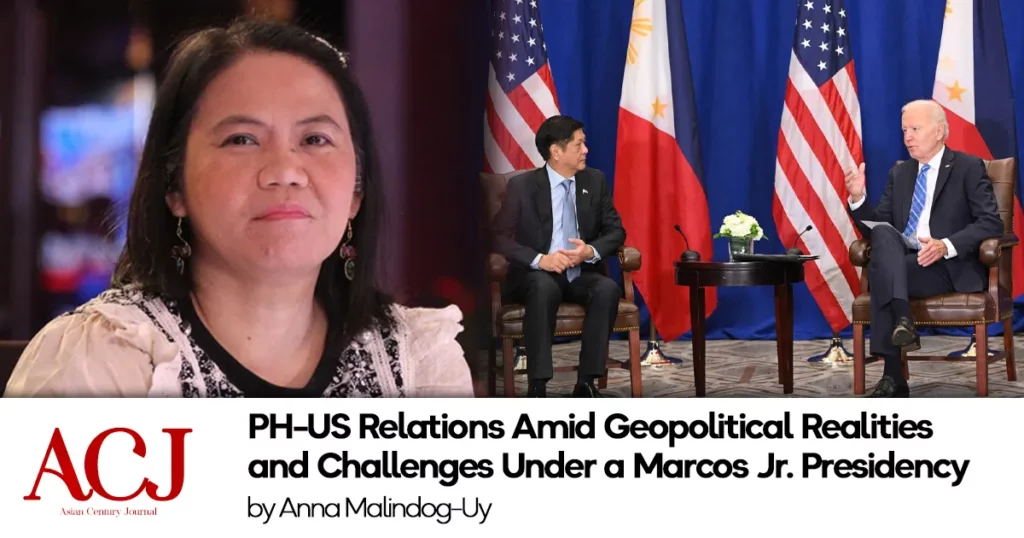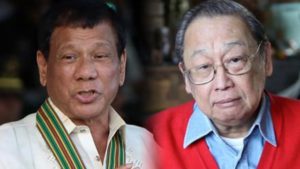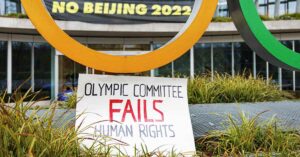
Two of the many essential questions in Philippine foreign policy that have been consistently asked by Filipinos and people in the foreign policy circle ever since the Philippines received its independence from the United States (U.S.) in 1946 are, “are Filipinos better off with the Americans, or without them?”
In a volatile world with challenging geopolitical realities, how should the Philippines navigate its relations with the U.S. without getting entangled and embroiled with Uncle Sam’s geopolitical problems and predicaments?
These reflective questions are resonant and relevant in many ways, given the recent pronouncements of President Ferdinand “Bongbong” Marcos Jr. during his bilateral talks with U.S. President Joe Biden last Thursday (22 September 2022), as part of his six-day working visit to the U.S. when he assured Biden that the Philippines remains a partner, ally, and friend of the U.S.
“We are your partners, we are your allies, we are your friends. And in like fashion, we have always considered the United States our partner, our ally, and our friend,” Marcos told Biden.
Marcos even mentioned the so-called “role” of the United States in maintaining peace in the Asia Pacific/ASEAN region, which according to him, “is something that is much appreciated by all the countries in the regions and the Philippines especially.”
But I think the most relevant statement that Marcos Jr. has spoken to Biden during his meeting with the U.S. President was when he said that “the primary consideration of the Philippines and the guiding principle of the Philippine foreign policy is to encourage peace.”
Nevertheless, the Philippine President did not mention in whatsoever terms the country’s pursuit of an independent foreign policy during his bilateral talks with Biden, and I am a bit curious in this regard.
Implications
Nevertheless, it is imperative to ask about the implications of Marcos Jr.’s statements concerning the United States Pivot to Asia foreign policy and the U.S. Indo-Pacific Strategy (IPS), which targets and intends to isolate China.
To note, the US Indo-Pacific Strategy has been driven by the compulsion of realpolitik in contemporary times. One of the core motives of the US foreign policy in the post-Second World War and even in the post-Cold War eras has been to preserve and promote its global hegemony. In this regard, the US Pivot to Asia or “Rebalance to Asia” is primarily an element of a bigger narrative to reassert US influence and leadership in the region and to counterbalance and contain China’s rise as a regional power in Asia, China’s increasing regional influence, and China as a rising contending world power to the United States.
The US Indo-Pacific Strategy is a foreign policy adopted by the US with the ultimate goal of not only promoting US interests by shaping the norms and rules of the Asia Pacific region, which mainly meant managing China’s behavior but also safeguarding and securing its survival as the global hegemon and dominant power in a unipolar international system continuously being challenged by the rise and the continuously growing influence of China not only as a regional power in Asia but even into a superpower status alongside the strengthening economic and military power of other contending regional powers like Russia and the like.
Furthermore, what are the implications and repercussions of Marcos Jr.’s statements during his meeting with Biden on what his second cousin Jose Manuel (Babes) Romualdez, Philippine Ambassador to the U.S., has been spreading that the Philippines, accordingly, would let U.S. forces use the country’s military bases in any eventualities that may happen in the Taiwan Strait?
Likewise, what are the knock-on effects of such statements from Marcos Jr., during his meeting with Biden on what his cousin Babes Romualdez said that Manila is in talks with Washington to increase the number of Philippine military bases that American forces can use in the country?
To date, the country is hosting foreign military facilities (bases) and soldiers. The Americans have boots on the ground and military facilities because of the Enhanced Defense Cooperation Agreement (EDCA), namely Subic Bay Naval Base, Basa Air Base, Fort Magsaysay, Antonio Bautista Air Base, Mactan-Benito Ebuen Air Base, and Lumbia Air Base, which are located for U.S. purposes. They’re near or on the South China Sea (SCS), significantly enhancing the U.S. military’s ability to challenge Beijing there.
Hindsight and Perspective
Hence, the gravity of these geopolitical-related questions and issues should be taken into account in how the Marcos Jr. administration navigates the country’s relations with the United States. As the chief architect of Philippine foreign policy, I suppose Marcos Jr. keeps in mind that the country’s national interests are paramount in every decision he makes concerning the above-mentioned geopolitical issues.
I suppose, as President Marcos Jr. travels through and plot the route of Philippines-US relations under his administration, I hope he stays on course and traverses the path of pursuing consistently and genuinely an independent foreign policy and steer clear of getting entangled and embroiled with the United States geopolitical predicaments and quandaries to avoid creating enemies by affiliation with the U.S., and unnecessarily. I believe this is the way forward.
To note, geopolitically speaking, the world has been in the most dangerous and volatile situation since World War II (1945). Thus, what the country needs is a genuine and consistent independent foreign policy that, first and foremost, attaches importance to and puts a premium on the country’s national interests as supreme and primordial. It should also be an independent foreign policy closely concomitant with ASEAN interests.
It should also be an independent foreign policy that is adjusted and fine-tuned to the changes in the strategic environment underpinned by the US-China geopolitical competition and rivalry.
Indeed, the rivalry and competition of major powers, particularly between China and the U.S., are one of the major geopolitical concerns of small countries like the Philippines. Thus, the Philippines must adapt and adjust to the changing geostrategic and geopolitical realities and environment of the Asia/Indo-Pacific region and beyond while protecting its core national interests and mitigating its sense of vulnerability amid the heightening competition and rivalry between the existing dominant power, the U.S. and the rising power in Asia and beyond, China.
Though the realities dictated by the country’s geography tell us that it is somewhat inevitable and a stern challenge for the Philippines not to be influenced by major power competition because of its strategic geopolitical location, the Philippines, as much as possible, should exert serious efforts to insulate itself from the strategic rivalry of the U.S. and China.
One possible way to do that is to rethink the country’s military agreements with the United States, like EDCA, the Visiting Forces Agreement (VFA), and the Mutual Defense Treaty (MDT).
Such action will give the Philippines the leeway and the option to recalibrate its strategic alignment to neutrality rather than being an outright military ally of the U.S. because of the MDT. This strategic-security configuration is a better alternative for balancing the United States and China while preserving and pursuing the country’s national interests.
Truth be told, maintaining the MDT, VFA, and EDCA in its format and substance at the moment is, in many ways, an antithesis of the country’s pursuit of a genuine independent foreign policy and non-aligned stance.
In addition, revisiting or repealing the country’s military agreements with the United States like EDCA, VFA, and the MDT will to a greater extent, soothe and alleviate China’s uneasiness and apprehension of a possible military encirclement by Washington, the Philippines being the thinkable and likely launch pad.
Conclusion
Hence, a genuine independent foreign policy for the Philippines matters, and it matters now more than ever before.
Suppose the Philippines wants to realize its aspiration of becoming an “upper middle income” economy. In that case, it must pursue a genuine independent foreign policy, for this path steers the way to peace and stability, paving the way toward economic development and prosperity.
In retrospect, the complications of geopolitics are indeed costly, and the Philippines can’t afford it. But the path toward economic development benefits the country and its people.
Source: Asian Century Journal
https://asiancenturyph.com/2022/09/24/ph-us-relations-amid-geopolitical-realities-and-challenges-under-a-marcos-jr-presidency/



